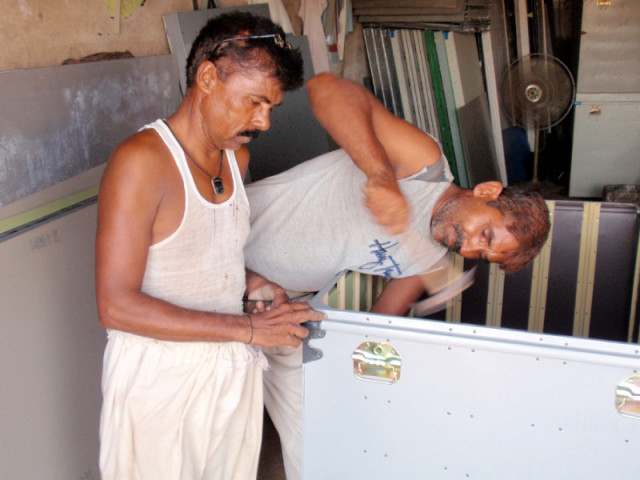Life inside a box: Dreams swept away
As the katcha residents, the makers of dowry boxes see their business come to a screeching halt.

As the katcha residents, the makers of dowry boxes see their business come to a screeching halt. PHOTO: SARFARAZ MEMON/EXPRESS
Zahid Mian, a labourer who toils all day to make large steel ‘dowry’ boxes, has seen business flounder – all because of the recent flooding.
“Residents of katcha areas order these boxes a lot,” he says, adding that people from these areas prefer these to suitcases. “It is a custom in rural Sindh to give these boxes, small and large, to daughters in dowry.”
Usually, after Eidul Fitr, the demand for these boxes surges as the wedding season commences. However, this year, with the rising water level in River Indus and the flooding along riverbeds, the demand has significantly decreased. Weddings, and lives, have been delayed, as people scrambled to take shelter on higher grounds.
Consequently, the lives of many – in the katcha and pakka areas – have been affected greatly. Amongst these are those engaged in the making of the dowry boxes.
What’s inside the box?
“These boxes are really spacious, and people can easily store quilts, bed sheets, pillows and other things inside,” explains Zahid.
Another labourer, Mumtaz Mirani, agrees with Zahid.
“We cater to the people of the katcha community. The bigger boxes are for storing dowry items, while the smaller ones are used to store valuables like ornaments and cash,” says Mirani. “We even have huge cylinder-type boxes that are in turn used to store grains and wheat flour.”
The cost conundrum
According to Mirani, the price for big boxes range from Rs4,000 to Rs15,000, depending on the quality and the gauge of the sheet used. Most sheets are apparently imported from Japan or China.
“We work on a daily wage basis,” he states quietly. “If we make a box, the owner will pay us. Otherwise, we return to our homes empty-handed.”
In this vein, Zahid earns Rs300 for each completed piece.
“The season for marriages begins after Eid and we had received dozens of orders, but the rise in the river marred our business,” he says, clearly worried about his income.
Katcha affecting the Pakka
“The rising water level in the katcha area has brought our business to a grinding halt – in this way, the Pakka areas have been greatly affected, as well,” says labourer Asadullah, who has been in the business for more than 25 years. “Now we have to wait until October for the water to recede. Until then, there’s no work, and we are borrowing money for our owner. We will pay back once work resumes.”
The water level is not the only reason for the decrease in business. Earlier, people from the katcha areas of Sukkur, Khairpur, Shikarpur, Jacobabad, Kashmore, and Dadu in Sindh and even Jhatpat in Balochistan, would come to Sukkur to order these boxes, says Asadullah. Now, however, many have learned this technique.
Widespread troubles
Mai Shahzadi Mirani often visits katcha areas near Ghotki and Kashmore to see her married daughters. She has observed, firsthand, the damage the water levels have brought forth. Katcha residents are greatly disturbed about the inundation of their villages.
“The majority of the people living in katcha areas are dependent upon the crops,” she says. “But, this year, not only are their crops damaged, but rising water has also caused damage to their houses.”
Speaking about the dowry boxes, Shahzadi cannot keep the emotion from her voice.
“This is the most important item of the dowry,” she exclaims. “A newlywed bride keeps all her belongings in it. With this inundation, the dreams of many residents have been shattered. Their crops are damaged, they are in debt, and now they will have to postpone weddings.”
Published in The Express Tribune, September 3rd, 2013.



















COMMENTS
Comments are moderated and generally will be posted if they are on-topic and not abusive.
For more information, please see our Comments FAQ